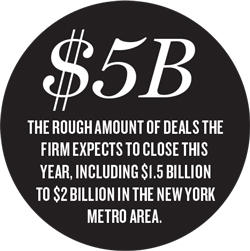When financier Howard Michaels was diagnosed with gastric cancer four years ago, he didn’t want anybody outside the firm to know about it.
Michaels, founder of the Carlton Group, continued working, sending emails up until the day before his death on Sept. 21, 2018.
“He hid that from everybody,” said Kevin Swill, former COO of Carlton. “He felt that our clients might go somewhere else if he wasn’t at the helm.”
But executives at the investment banking firm were quietly preparing for Michael Campbell, a 20-year veteran of Carlton, to take the reins.
This meant not only prepping the 30-person firm for the transition but also gradually moving beyond Michaels’ deals. The “Campbell Team” was formed to pursue its own investments and elevate the heir apparent in the minds of clients.
“Michael basically stepped a little bit away from Howard,” said COO and general counsel Daniel Bildner, to “make a name for himself separate, apart from Howard.”
Now Campbell, who was officially named CEO in November, and Bildner are shepherding the firm into its next chapter, which they say will focus on expanding Carlton’s reach nationally, a stark departure from Michaels’ hyper-focus on big-ticket deals in New York City.
The transition, in some ways, is a case study on succession in an industry that hinges on relationships, especially when the longtime face of a company is gone (see related story here).
 Carlton — which has closed $144 billion in debt and equity deals since its inception in 1991— is expanding its territory but is still trying to get prospective clients to think of the firm as more than just one person. And industry sources say the firm’s success was inflated, in part, by Michaels — a larger-than-life personality who was known for his hard-driving style. Without him, they say, the firm is in danger of losing market share.
Carlton — which has closed $144 billion in debt and equity deals since its inception in 1991— is expanding its territory but is still trying to get prospective clients to think of the firm as more than just one person. And industry sources say the firm’s success was inflated, in part, by Michaels — a larger-than-life personality who was known for his hard-driving style. Without him, they say, the firm is in danger of losing market share.
“The business that he had was for very few clients. He was losing that business for the last few years,” said one debt broker, on the condition of anonymity. “The business was always projected as more than it was.”
The transition
It was the late 1990s when Campbell and Michaels first crossed paths. Campbell was a student at New York University’s Schack Institute of Real Estate, and Michaels came in as a guest speaker. Michaels spoke about the deals he was working on in Manhattan and how much money could be made in the business. Campbell was attracted to Michaels’ energy and enthusiasm.
“I sent him my résumé, called him like 100 times before he called me in, and then he hired me on the spot, pretty much,” said Campbell, who at the time was working at financial firm PGIM. “And I’ve been with him ever since”
When Campbell joined in 1999, Carlton had fewer than 10 people and was just starting to carve out its niche as a boutique investment bank. Campbell found that — as a fresh-faced, 26-year-old broker — he was given more opportunities at Carlton than he would’ve been at a bigger and more well-known firm. By 2002, he was a partner.
Over the years, Carlton has become known in New York City for arranging highly leveraged joint-venture equity deals. It ranked 13th on The Real Deal’s most recent list of the top commercial debt brokerages in the city, having negotiated $981.3 million in debt in 2017. The company ranked slightly behind the now-defunct Eastern Consolidated’s $1.2 billion and Ackman-Ziff’s $1.3 billion.

Carlton’s most prominent deals include brokering an $830 million loan for HFZ Capital Group’s May 2015 acquisition of a development site at 518 West 18th Street. It also handled a $125 million equity raise for the Witkoff Group at 111 Murray Street in 2015. And it helped arrange $2 billion in acquisition and construction loans and joint-venture equity for Maefield Development for its 452-key Marriott Edition hotel at 20 Times Square in 2015. (Carlton was a partner on the project, alongside Steve Witkoff, Michael Ashner’s Winthrop Realty Trust and Howard Lorber’s New Valley. Maefield subsequently bought out Carlton and the other partners for $1.5 billion.)
“I’m always amazed at the deals they are able to capitalize,” Ashner said. “They seemed to get a number of deals that no one else can get done.”
Campbell said he shares Michaels’ knack for arranging large and complicated deals in New York — those valued at $100 million or more. But he said he’s now more focused on raising equity across the country, including for deals on the West Coast as well as in Chicago, Florida, New Orleans, Denver, Texas and elsewhere.
While the amounts brokers make on deals is usually held close to the vest, Campbell filed for personal bankruptcy in May 2016 amid a contentious divorce, and the filings provided a rare glimpse into the firm’s financial hauls.
At the time, Michaels said it had “no bearing on the company.”
The documents detailed 10 deals that were expected to close in 2016, totaling $1.63 billion, although Carlton told TRD at the time that the figure was closer to $1.98 billion. From those deals, the documents estimated that Carlton would make just under $25 million in fees — an average of 1.3 percent (of $1.98 billion). Campbell would make an estimated $6.23 million — about a quarter of Carlton’s take.
Campbell says it was always clear that he would eventually take over for Michaels, given that he’d been a partner since the early aughts. Any doubts of his future role were likely dispelled when Swill left in 2017 to become COO of Kennedy Development Partners in Florida.

The company helped arrange $2 billion in acquisition and construction loans and joint-venture equity at 20 Times Square.
For the last few years, since Michaels got sick, Campbell had been preparing to helm the company, which recently moved from 560 Lexington Avenue to 360 Madison Avenue. He said there were difficult conversations with Michaels in the years leading up to his death. “Up until he almost died, he didn’t want to believe it. You know he didn’t want to acknowledge that he was dying,” Campbell said. “I didn’t want to acknowledge that he was dying, to be honest. You know it’s not an easy thing to talk about, death.”
While those conversations were hard, Campbell said he and Michaels had an agreement about the fate of the company. Campbell now owns a majority stake in the firm but emphasized that he and Bildner are co-managing principals.
The key to the transition was ensuring that Campbell and others at the company were able to build up their name recognition.
“It’s just that Howard was always the face of the company, and I think that may have made some people think that he was the only one that did business,” Campbell said. “He did a lot of business, don’t get me wrong. He was very good. But there are also very many talented people in our firm still, who are also just as successful.”
Several brokers working for the city’s top firms bristled at Carlton being called a competitor. They said the firm seemed to peak in the early 2000s. Some also argued that the importance of the company in the New York market was overblown.
“They historically have a reputation of being full of shit,” said one debt broker on the condition of anonymity, who also acknowledged that Michaels was well-known and had success in the industry.
Campbell dismissed that and said the firm’s “landmark transactions speak for themselves.”
Lorber, who is also CEO of the Vector Group, noted that there’s a lot of competition in New York and several financing sources to choose from, so other firms might not see Carlton as a competitor because the firm is very equity-driven and chases massive deals.
Lorber said he hasn’t really dealt with Campbell but remembers him sitting in on some meetings with Michaels.
“Michael Campbell really had his own book of business,” Lorber said. “If he had a talent for bringing in business, then why shouldn’t he continue?”
Ashner said industry players are savvy enough to know that Michaels didn’t orchestrate these deals single-handedly.
Yitzchak Tessler, founder of Tessler Development, said he’s worked with Carlton on five or six deals. He noted that Campbell was instrumental in arranging financing for an office building at 150 Nassau Street, which he purchased in 2000 for $46.3 million.
“The devil’s in the details. [Campbell] was hands-on on the details, on every deal,” he said.
Culture change
Campbell said he expects to close $4.5 billion to $5 billion in deals this year, of which $1.5 billion to $2 billion will be in the New York metro area.

The firm handled a $125 million equity raise at 111 Murray Street.
Their investors tend to be “off the radar” family funds — both in the U.S. and overseas — that prefer to be either the only investor on a deal or teamed up with one other limited partner.
While there’s been a slowdown in capital from China, Carlton’s seen interest pick up in India, Korea, Singapore, Japan and the Middle East, Campbell said.
Nicholas Mastroianni II, founder of the U.S. Immigration Fund for EB-5 investment, worked with Carlton when it helped arrange Maefield’s $2 billion acquisition and development of 1568 Broadway and when it raised equity from an Asia-based investor for 111 Murray Street.
He said Carlton and other firms need to diversify the markets they are targeting, given the slowdown in New York.
“It’s not what it was from 2012 to 2017, when things were insane,” Mastroianni said. “A lot of other markets are strong, and they are smart to do that.”
He added that while many developers went to Michaels because he had a reputation for “getting things done,” Campbell has a more “even-keeled” approach that will likely play in the firm’s favor — especially when working with those who were turned off by Michaels’ brash and aggressive style.
To that end, some expect the culture at the firm to change.
Michaels had a reputation for being an extremely tough boss with a short temper, who demanded late hours and held mandatory Sunday morning conference calls. (Campbell noted that those calls were discontinued years ago.) But in 2011, Michaels acknowledged to TRD that “Carlton is not for the faint-hearted.”
“If you’re not serious about work, this is probably not a good place,” he said at the time. “But if it’s someone who’s motivated and wants to do well, this is a great place to work.”
Campbell said that as a boss, “you have to be in the trenches with your people so you know how hard you can push them.”
He said he has his own style but approaches deals in the same aggressive way Michaels did.
“We’re a new spin on the company,” Bildner said. “What doesn’t change is the business model and the tenacity on behalf of our clients and getting our deals done.”
Avison Young’s Justin Piasecki, who worked at Carlton for five years, said Campbell has a “softer and gentler” approach and, unlike Michaels, is someone who can have extended conversations with employees.
He added that Campbell is respected in the industry and that he doesn’t think that firm’s deal volume will change much.
“They are like any other shop, really. They have a good history of deals,” Piasecki said. “I think if anything, it’ll run a little more smoothly now that Michael has taken the gloves off.”
